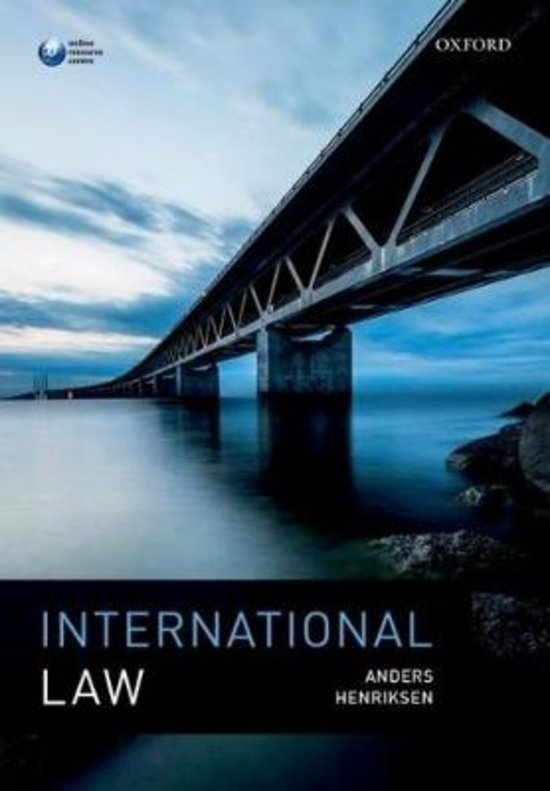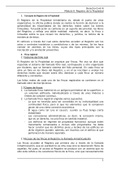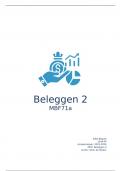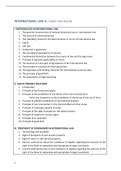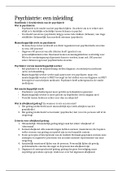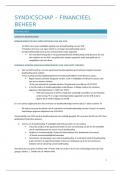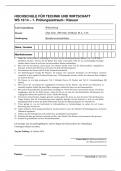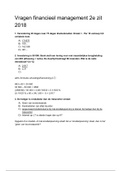Course Page 1 of
Public International Law – Course Notes
Description: 22
Course Notes
Lecture 1: Introduction to Public International Law
▪ Public International Law
It consists of rules and principles that regulates the relations between States, and other entities who possess
rights and/or obligations under international law (international legal personality).
e.g. International agreements, diplomatic relations, trade, protection of human rights, conduct of armed conflict
Historical development
- 1648 Peace of Westphalia
o series of peace treaties marking the end of the religious Thirty Years War
o A key building block of international law
o Marks the beginning of modern international law
- 17th Century
o Hugo Grotius: ‘Father of International Law’
Contribution to the development of international law
o Author of International Law’s most important texts
• The Law of armed conflict and aggression
• Binding force of treaties
• The Freedom of Seas
• On the Law of War and Peace
Theories
- Natural Law [Hugo Grotius]
o Law is not made, but found
o Universal values existing by nature and can be found through human reasoning
- Positive Law [John Austin]
o Law is not given, but man-made
o Law is made by sovereigns (States) and can be found in treaties
International law is positive law (so it’s not written in morality)
Structure of PIL
International law of coexistence
- Contains the answers required to sperate the powers of sovereign states and uphold peaceful coexistence
- Horizontal/interaction btw states
- Ensure that states can pursue their different and separate interests and still respect the sovereignty of other
states
- Delimitation of territory; criteria of statehood, recognition of new states, use of force
International law of cooperation
- Contains the legal answers to issues that are not inherently of interest to two or more states but are matters
of international concerns
- Treaties
e.g. International human rights; international environmental law; international economic law; EU law.
▪ Modern Era
- Creation of modern sovereign States
, International Bachelor of LAW Program 2018-2019
Course Page 2 of
Public International Law – Course Notes
Description: 22
- Use of treaties to regulate interaction between state
- Emergence of International organizations
e.g. Universal Postal Union (1874), International Committee of Red Cross (1863), Permanent Court of Arbitration (1899)
- Focus on Europe
o Colonization outside Europe
- Outbreak World War I (1914 – 1918)
After WW I
- Establishment of League of Nations, based in Geneva
- To secure International peace
- Permanent Court of International Justice in The Hague, Scheveningen
- However: Outbreak World War II (1940 – 1945)
After WW II
- The United Nations (UN) established with its main objective being protecting and restoring International
peace and security
▪ The United Nations
Six main organs (Article 7 of the 1945 United Nations Charter)
1) General Assembly (Chapter IV, UN Charter): the representative body of the UN
• All UN Member States have a seat (193) in GA
• Can only adopt non-binding resolutions
On a wide range of issues, e.g. political, economic, humanitarian, social or legal matters
2) Security Council (Chapter V, UN Charter): the only UN body with the power to adopt binding resolution
• 15 members
5 permanent members with a veto (China, France, UK, USA, Russia – because they won WW II)
10 non-permanent members elected for a two-year period
‘Chapter VII resolution’
In cases where there is a threat to or breach of integration peace and security, or an act of aggression
3) Economic and Social Council
4) Trusteeship Council
5) International Court of Justice (Chapter XIV, UN Charter)
• Consent-bases jurisdiction to settle disputes between States
ONLY States
Binding decision (judgment)
• Advisory jurisdiction to advice UN organs on a legal question
ONLY UN organs
Binding decision?
6) Secretariat
▪ Major issues
Cold War
• The world dived into two blocks
• No armed violence, yet in failure of collective security
• SC paralyzed, unable to adopt a resolution and to act effectively
Decolonization
• UN Special Committee on Decolonization
• Allowing a process of self-determination of peoples

